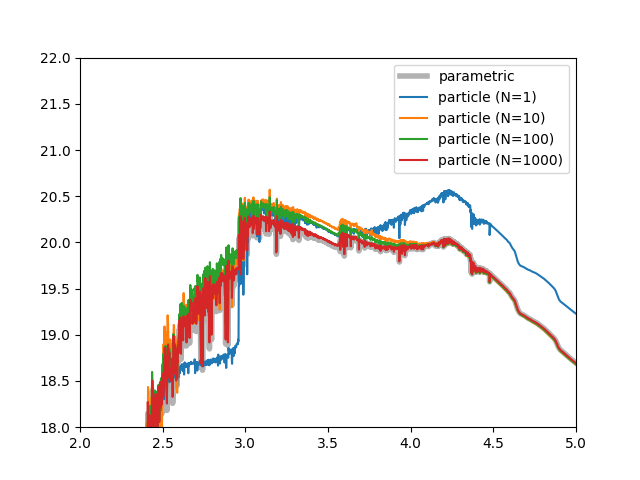Note
Go to the end to download the full example code.
Compare parametric and particle SEDs¶
This example compares a sampled and binned (parametric) SED for different numbers of particles

import matplotlib.pyplot as plt
import numpy as np
from unyt import Msun, Myr
from synthesizer.emission_models import IncidentEmission
from synthesizer.grid import Grid
from synthesizer.parametric import SFH, ZDist
from synthesizer.parametric import Stars as ParametricStars
from synthesizer.parametric.galaxy import Galaxy as ParametricGalaxy
from synthesizer.particle.galaxy import Galaxy as ParticleGalaxy
from synthesizer.particle.stars import sample_sfzh
# Define the grid
grid_name = "test_grid"
grid_dir = "../../tests/test_grid/"
grid = Grid(grid_name, grid_dir=grid_dir)
# Define the incident emission
model = IncidentEmission(grid)
# Define the SFH and metallicity distribution
Z_p = {"metallicity": 0.01}
metal_dist = ZDist.DeltaConstant(**Z_p)
sfh_p = {"duration": 100 * Myr}
sfh = SFH.Constant(**sfh_p)
# Define the parametric stars
sfzh = ParametricStars(
grid.log10age,
grid.metallicity,
sf_hist=sfh,
metal_dist=metal_dist,
initial_mass=1 * Msun,
)
# Compute the parametric sed
parametric_galaxy = ParametricGalaxy(sfzh)
parametric_galaxy.stars.get_spectra(model)
sed = parametric_galaxy.stars.spectra["incident"]
plt.plot(
np.log10(sed.lam),
np.log10(sed.lnu),
label="parametric",
lw=4,
c="k",
alpha=0.3,
)
# Compute the particle Sed for a range of particle samples
for nstar in [1, 10, 100, 1000]:
# Get the stars object
stars = sample_sfzh(
sfzh.sfzh,
sfzh.log10ages,
sfzh.log10metallicities,
nstar,
initial_mass=1 / nstar * Msun,
)
# Get the particle galaxy
particle_galaxy = ParticleGalaxy(stars=stars)
# Calculate the stars SEDs using nearest grid point
ngp_sed = particle_galaxy.stars.get_spectra(
model, grid_assignment_method="ngp"
)
plt.plot(
np.log10(ngp_sed.lam),
np.log10(ngp_sed.lnu),
label=f"particle (N={nstar})",
)
plt.legend()
plt.xlim([2, 5])
plt.ylim([18, 22])
plt.show()
Total running time of the script: (0 minutes 0.585 seconds)